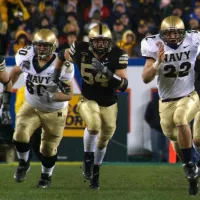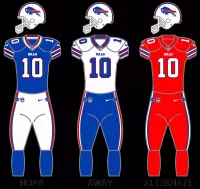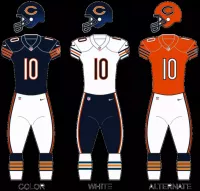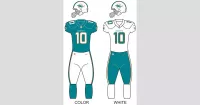The NFL Draft, officially the Annual Player Selection Meeting, is an annual event where NFL teams select eligible college football players. Teams are assigned a draft order based on the previous season's record, with the team having the worst record drafting first and the Super Bowl champion drafting last. Teams can either select a player or trade their draft position for other assets. The draft has been held annually since 1936 and serves as the primary means for teams to acquire new talent.
11 hours ago : NFL Draft Buzz: Combine Interviews, Free Agency, and Trade Speculation Heats Up
NFL GMs are actively discussing free agency and potential trades as draft prospects undergo interviews and on-field evaluations at the NFL Combine. Dan Morgan expresses eagerness to bolster the linebacker position. Looking ahead, details for the 2026 NFL Scouting Combine have been released.
1925: Inaugural East-West Shrine Bowl
In 1925, the East-West Shrine Bowl, the oldest running college all-star game, was established. It provides college players aiming for the NFL draft an opportunity to display their skills and learn from NFL coaches, while also raising funds for Shriners Hospitals for Children.
December 1934: The NFL introduced a waiver rule.
In December 1934, the NFL introduced a waiver rule to prevent teams from giving the right of usage of two players to another team. Any player released by a team during the season would be able to be claimed by other teams.
1934: Stan Kostka led the Minnesota Gophers to an undefeated season.
In 1934, Stan Kostka led the Minnesota Gophers to an undefeated season.
May 18, 1935: Bert Bell proposed a draft be instituted.
On May 18, 1935, Bert Bell proposed a draft be instituted to enhance the possibility of competitive parity on the field in order to ensure the financial viability of all franchises. His proposal was adopted unanimously that day.
August 25, 1935: Stan Kostka signed with the Brooklyn Dodgers.
On August 25, 1935, Stan Kostka signed a $5,000 contract with the Brooklyn Dodgers and became the league's highest-paid player after holding out for the highest possible offer.
1935: The Eagles finished in last place.
In the 1935 NFL season, the Eagles finished in last place at 2–9, thus securing themselves the first pick in the draft.
February 8, 1936: The first NFL draft began.
On February 8, 1936, the first NFL draft began at the Ritz-Carlton Hotel in Philadelphia. The first player selected in the draft was Jay Berwanger.
1936: Wellington Mara built up dossiers of college players across the country, resulting in the Giants' drafting of Tuffy Leemans.
In 1936, Wellington Mara built up dossiers of college players across the country by subscribing to magazines and local and out-of-town papers, which resulted in the Giants' drafting of Tuffy Leemans.
1936: The NFL instituted the draft.
In 1936, as a response to the bidding war for Stan Kostka, the NFL instituted the draft.
1936: The first NFL draft was held
In 1936, the first NFL draft was held to recruit players into the National Football League. This event has been held every year since then and serves as the most common source of player recruitment.
1937: NFL Draft in New York City
In 1937, the NFL draft was held in New York City.
1938: Art Rooney chose Byron "Whizzer" White in the first round of the draft.
In 1938, Art Rooney chose Byron "Whizzer" White in the first round of the NFL draft and gave him a guaranteed contract of $15,000.
1939: Kenny Washington was viewed as one of the greatest college football players of all time.
In 1939, Kenny Washington was viewed as one of the greatest college football players of all time.
1939: Wellington was put in charge of drafting players for the Giants.
In 1939, Wellington was put in charge of drafting players for the Giants for the first time. He submitted the list of players into the pool that the Giants could choose players from.
1939: NFL Draft in New York City
In 1939, the NFL draft was held in New York City.
1940: Kenny Washington was not drafted by any team.
In 1940, Kenny Washington was not drafted by any team after information was made available to at least one owner of a franchise that Washington was African-American.
1941: NFL Draft in Washington, D.C.
In 1941, the NFL draft was held in Washington, D.C.
1942: "Bullet Bill" Dudley was the first overall pick in the draft.
In 1942, "Bullet Bill" Dudley was the first overall pick in the NFL draft.
1945: NFL Draft in New York City
In 1945, the NFL draft was held in New York City.
1946: Eddie Kotal became the first player scout.
In 1946, Eddie Kotal became the first player scout when he was hired by Dan Reeves of the Los Angeles Rams.
1947: The Eagles and Chicago Cardinals standings' did not improve.
In 1947, perennial losers, such as the Eagles and Chicago Cardinals, standings' did not improve despite the draft.
1947: NFL Draft in New York City
In 1947, the NFL draft was held in New York City.
1947: The NFL temporarily instituted a bonus pick.
In 1947, the NFL temporarily instituted a bonus pick due to competition with the All-America Football Conference (AAFC). Under this system, the first overall selection was awarded as a bonus pick by a random draw.
1949: George Taliaferro became the first African-American selected in the NFL draft.
In 1949, George Taliaferro became the first African-American selected in the NFL draft when he was chosen in the thirteenth round.
1952: NFL Draft in New York City
In 1952, the NFL draft was held in New York City.
1955: NFL Draft in New York City
In 1955, the NFL draft was held in New York City.
1958: The bonus pick system was abolished.
By 1958, all twelve clubs in the league at the time had received a bonus choice and this system was abolished.
1960: The 1960 NFL draft marked a turning point in the draft's history.
In 1960, the NFL draft marked a turning point in the draft's history because of the pending arrival of the American Football League (AFL).
1964: NFL Draft Location
In 1964, the NFL draft was held in Chicago for the last time before returning in 2015.
1965: NFL Draft in New York City
Between 1965 and 2014, the draft was held entirely in venues within New York City.
1965: NFL Draft by Telephone
In 1965, the NFL draft was conducted without a physical location, instead utilizing telephone communication.
1965: NFL settled on New York City for the draft location.
In 1965, the NFL settled on New York City as the location for the draft. It remained there for fifty years.
1966: NFL Draft in New York
In 1966, the NFL draft was held in New York.
1976: Paul Salata coined the moniker "Mr. Irrelevant".
In 1976, former NFL wide receiver Paul Salata first coined the moniker "Mr. Irrelevant" to refer to the last overall player selected in the draft.
1977: Evolution of NFL Scouting Combine
In 1977, the NFL Scouting Combine's origins trace back to the National, BLESTO, and Quadra Scouting services. This marked the beginning of a standardized assessment process for college football players seeking to enter the NFL draft.
1977: Inauguration of NFL Supplemental Draft
Since 1977, the NFL has held a supplemental draft to accommodate players who didn't enter the regular draft, usually due to missed deadlines or eligibility issues.
1978: Shouldergate controversy
The Pittsburgh Steelers forfeited a third-rounder pick in 1979 for the 1978 Shouldergate controversy.
1979: Steelers forfeit third-round pick
The Pittsburgh Steelers forfeited a third-rounder pick in 1979 for the 1978 Shouldergate controversy.
1980: ESPN broadcast coverage of the NFL draft live.
In 1980, ESPN broadcast coverage of the NFL draft live on ESPN.
1980: First Televised NFL Draft
In 1980, ESPN televised the NFL draft for the first time.
1980: Picks forfeited since 1980
Since 1980, a total of 28 selections have been forfeited for rules violations by 15 teams.
1983: Miami National Championship
In 1983, Bernie Kosar led the University of Miami to its first national championship.
1983: Patriots coaching staff excluded from personnel decisions
In 1983, New England Patriots head coach Ron Meyer stated that the team, led by owner Billy Sullivan, excluded the coaching staff from any personnel-related decisions.
1983: Steelers draft Gabriel Rivera over Dan Marino
In the 1983 draft, Pittsburgh Steelers' head coach Chuck Noll had "the final say" over picks, which led to the team drafting Gabriel Rivera over Dan Marino. Rivera only played six games before becoming paralyzed in a drunk-driving crash.
1984: Supplemental Draft for USFL and CFL Players
In 1984, the NFL held a supplemental draft specifically for players under contract with USFL and CFL teams.
1985: Controversial Supplemental Draft
The 1985 supplemental draft was controversial, particularly with Quarterback Bernie Kosar wishing to turn pro rather than finish eligibility at Miami.
1987: Brian Bosworth's Draft Strategy
In 1987, Brian Bosworth didn't declare for the NFL draft because he didn't want to play for the Indianapolis Colts or Buffalo Bills. The Seattle Seahawks drafted him in the supplemental draft and signed him to a 10-year, $11 million contract, which was the largest rookie contract in NFL history at the time.
1987: ESPN began televising games with 'ESPN Sunday Night NFL'
In 1987, ESPN began televising games with 'ESPN Sunday Night NFL'.
1988: Death of Art Rooney
Art Rooney died in 1988.
1988: The NFL moved the draft from weekdays to the weekend.
In 1988, the NFL moved the draft from weekdays to the weekend, and ESPN's ratings of the coverage improved dramatically.
1990: Supplemental Draft Eligibility
As of the 1990 season, only players who had graduated or exhausted their college eligibility were made available for the supplemental draft.
1993: Change in Supplemental Draft
Since 1993, only players who had planned to attend college but couldn't for various reasons have been included in the supplemental draft.
1995: NFL Draft at The Theater at Madison Square Garden
In 1995, the NFL Draft was held at The Theater at Madison Square Garden, which hosted the event for a decade.
1998: Will Wolford salary cap circumvention
The Pittsburgh Steelers forfeited one pick (a third rounder in 2001) due to trying to circumvent the salary cap involving offensive lineman Will Wolford in 1998.
2001: Steelers forfeit third rounder
In 2001, the Pittsburgh Steelers forfeited a third rounder due to trying to circumvent the salary cap involving offensive lineman Will Wolford in 1998.
October 2003: NFL Network launched.
In October 2003, the NFL Network launched.
2003: Minnesota Vikings miss their draft pick
In the 2003 NFL draft, the Minnesota Vikings were late with their 7th overall pick. The Jacksonville Jaguars drafted quarterback Byron Leftwich and the Carolina Panthers drafted offensive tackle Jordan Gross before the Vikings were able to submit their selection of defensive tackle Kevin Williams.
2004: NFL Draft at The Theater at Madison Square Garden
In 2004, the NFL Draft was held at The Theater at Madison Square Garden, which was the final year for the venue, before moving to Javits Convention Center in 2005.
2005: ESPN televised games with 'ESPN Sunday Night NFL'
In 2005, ESPN televised games with 'ESPN Sunday Night NFL'.
2005: NFL Draft at Javits Convention Center
In 2005, the NFL Draft was moved to the Javits Convention Center following a dispute with the Cablevision-owned arena.
2006: ESPN received competition for the NFL draft coverage.
In 2006, ESPN received competition when the NFL Network began to produce its own draft coverage.
2006: NFL Draft at Radio City Music Hall
In 2006, the NFL draft was held at Radio City Music Hall, which hosted the event until 2014.
2007: San Diego Chargers Draft FS Paul Oliver
In 2007, FS Paul Oliver was selected by the San Diego Chargers in the fourth round of the supplemental draft.
2007: Time limits for draft selections
Until 2007, the time limits for draft selections were 15 minutes in the first round, 10 minutes in the second, and 5 minutes for all subsequent rounds.
2008: Rookie salary cap allotments
In 2008 the highest rookie salary cap allotment was about $8.22 million for the Kansas City Chiefs, who had 12 picks, including two first-rounders, while the lowest was the $1.79 million for the Cleveland Browns who had only five picks, and none in the first three rounds.
2008: Chargers Forfeit Draft Pick
In the 2008 NFL draft, the Chargers forfeited a fourth-round pick due to selecting Paul Oliver in the fourth round of the supplemental draft in 2007.
2009: Lions pick Stafford with the first overall selection
In the 2009 NFL draft: the Detroit Lions picked Stafford with the first overall selection in the draft, and had agreed to a six-year, $78 million deal ($41.7 million guaranteed) with Stafford a day before the draft officially started.
2010: The 2010 NFL draft occurred for the 2010 NFL season.
In 2010, the NFL draft was held for the 2010 NFL season. The name of the draft each year takes on the form of the NFL season in which players picked could begin playing.
2010: The NFL moved to a three-day draft.
In 2010, the NFL moved to a three-day draft.
2011: Baltimore Ravens time expired
In 2011, as the Baltimore Ravens were negotiating a trade with the Chicago Bears, their time expired and allowed the Kansas City Chiefs to pick ahead of Baltimore, who were unable to finalize the trade with Chicago.
2011: Rookies have compensation and duration predetermined
Since 2011, all rookies that are drafted, even those drafted first overall, now have their compensation and duration predetermined each year before the draft occurs, and can no longer negotiate beforehand.
2012: New York City Bid for the 2012 Summer Olympics
In 2012, New York City bid for the Summer Olympics, with the West Side Stadium intended to be the centerpiece of the bid.
2014: NFL Draft at Radio City Music Hall
In 2014, the NFL draft was held at Radio City Music Hall, marking the end of its tenure at this venue.
2014: NFL Draft in New York City
In 2014, the NFL draft was held in New York City.
2014: Radio City Music Hall scheduling conflict
In 2014, the NFL grew frustrated with Radio City Music Hall when the draft needed to be scheduled later than planned in the year due to a scheduling conflict at the venue; this prompted the league to open bidding for a new site to host its 2015 draft.
2014: Draft pick cycling due to tied team records
In the 2014 NFL draft, teams with identical records within their tier "cycled" picks in each subsequent round. For example, the Jacksonville Jaguars, Cleveland Browns, Oakland Raiders, Atlanta Falcons, and Tampa Bay Buccaneers all finished 4–12, and selected in that order in the first round. In the second round, Jacksonville cycled to the back of the line with the order becoming Cleveland, Oakland, Atlanta, Tampa Bay, and Jacksonville. That cycling continued in each round.
2015: Chicago hosts the NFL Draft
In 2015, Chicago reimagined the NFL draft into a much larger event, making the event accessible to large public attendance. The city erected a large free-admission multi-day fan festival dubbed "Draft Town" that drew 200,000 visitors.
2015: Inception of Texas All-Star Game
In 2015, an independently operated annual post-season college football all-star game was created in Texas for small college players from FCS, NCAA Division II, NCAA Division III, and the NAIA, designed to give these players exposure to NFL teams and other professional leagues.
2015: Future draft locations started being determined through a yearly bidding process.
In 2015, future NFL draft locations started being determined through a yearly bidding process. The draft location had continually changed over the years to accommodate more fans.
2015: Time for seventh-round selections was shortened
The time for seventh-round selections was shortened from five to four minutes in 2015.
2016: Chicago Hosts the NFL Draft for the Second Consecutive Year
In 2016, Chicago won the bidding again and hosted the NFL draft, marking the transformation of the draft into an event featuring festivities and large public crowds.
2016: Transition to Drill Showcase Format
In 2016, the Texas post-season event transitioned from an all-star game to a drill showcase and "controlled scrimmage" format, while also including educational seminars for players on the business aspects of a professional sports career.
2016: Establishment of Florida Event
Since 2016, an NFL draft event has been held in Florida, and over 350 of its alumni have gone on to play in the NFL.
2017: Compensatory selections can be traded
Compensatory selections can be traded; this began with the 2017 NFL draft.
2018: Patrick Mahomes named NFL MVP
In 2018, Patrick Mahomes was named NFL MVP.
2018: The NFL draft was first carried on broadcast television.
In 2018, the NFL draft was first carried on broadcast television. Fox and NFL Network simulcast the first two nights of the draft, with both nights featuring personnel from both NFL Network and Fox. ESPN continued to produce its own coverage of the draft, with ESPN2 simulcasting days 1 and 2, and ABC simulcasting day 3.
2019: ABC picks up broadcast television rights for all 3 days of the draft
In 2019, ABC picked up the broadcast television rights for all 3 days of the NFL draft. ABC's coverage would have the College GameDay crew on days 1 and 2, with Good Morning America anchor Robin Roberts, joined by 2018 NFL MVP and Kansas City Chiefs quarterback Patrick Mahomes, and Grammy Award winner Taylor Swift, co-hosting with GameDay host Rece Davis on day 1.
2019: NFL Draft in Nashville
In 2019, the NFL draft was held in Nashville.
2019: Taylor Swift announces new single "ME!"
On day 1 of the 2019 NFL draft, Taylor Swift announced her new single "ME!", featuring Panic! at the Disco's Brendon Urie, being released at midnight ET, with the music video debuting on YouTube at the same time.
November 2020: NFL rewards teams for developing minority candidates
In November 2020, Resolution JC-2A was enacted by the NFL. This resolution rewards teams for developing minority candidates for head coach and/or general manager positions by awarding draft picks.
2020: Mike Greenberg took over as ESPN's host for the first two nights
After Wingo left ESPN in 2020, Mike Greenberg, host of Get Up!, took over as ESPN's host for the first two nights
2020: 2020 NFL Draft moved to virtual format
Due to the COVID-19 pandemic, the 2020 NFL draft, which was supposed to be in Las Vegas, was moved to a virtual format. NFL Network decided to simulcast ESPN's coverage of all 3 days, with personalities from NFL Network and ESPN joining remotely from their homes or ESPN's Bristol, CT studios.
2020: Virtual NFL Draft
In 2020, due to the COVID-19 pandemic, the NFL draft, originally scheduled for Las Vegas, was conducted virtually via telecommunication.
2020: The 2020 CBA explicitly provided the details of a new formula
The 2020 CBA explicitly provided the details of a new formula, still based primarily on salary.
2021: NFL Network returns to producing their own coverage of the draft
In 2021, after a one-year hiatus, NFL Network returned to producing their own coverage of the draft. ESPN and ABC continued to carry separate feeds.
2022: Eligibility for trading picks
For the 2022 draft, only picks through the 2024 draft could be traded prior to the draft, and once the 2022 draft started, picks from the 2025 draft became eligible to be traded.
2022: HBCU Legacy Bowl Inauguration
In 2022, the HBCU Legacy Bowl was established for NFL draft-eligible players from Historically Black Colleges and Universities. Played at Yulman Stadium in New Orleans, it serves as the final all-star game in the draft cycle and hosts the NFL's HBCU Combine.
2022: 2022 NFL Draft heads to Las Vegas
In 2022, the draft headed to Las Vegas after a two-year wait. ESPN announced that insider Adam Schefter would miss the draft to attend his son's college graduation, and Mel Kiper Jr. would participate virtually because of his COVID-19 vaccination status. Kirk Herbstreit meanwhile, announced himself that he would be dropping out of ABC's draft coverage due to blood clots.
2023: Senior Eligibility for All-Star Games
In the 2023 season, only seniors or graduate students were eligible to participate in college all-star games, maintaining a long-standing tradition of showcasing upperclassmen talent to NFL scouts and coaches.
2024: Eligibility for trading picks
For the 2022 draft, only picks through the 2024 draft could be traded prior to the draft, and once the 2022 draft started, picks from the 2025 draft became eligible to be traded.
2024: Juniors Allowed in Select All-Star Games
For the 2024 NFL draft, the league eased its rules to allow juniors to participate in three college football postseason all-star games: the Senior Bowl, East–West Shrine Bowl and the HBCU Legacy Bowl.
2024: NFL Draft attendance record in Detroit
The 2024 NFL draft in Detroit set the all-time attendance record with more than 775,000.
2025: Eligibility for trading picks
For the 2022 draft, only picks through the 2024 draft could be traded prior to the draft, and once the 2022 draft started, picks from the 2025 draft became eligible to be traded.
2025: NFL Draft in Green Bay
In 2025, the NFL draft will be held in Green Bay.
Mentioned in this timeline
The Kansas City Chiefs are a professional American football team...

College football is a popular amateur sport in the United...

The Buffalo Bills are an NFL team representing the Buffalo...

Washington D C is the capital city and federal district...

The Chicago Bears are a professional American football team based...

The Miami Dolphins are a professional American football team based...
Trending

42 minutes ago Apple MacBook Pro: Touchscreen, Dynamic Island, and New Interface Coming Soon.

43 minutes ago Microsoft and SpaceX Starlink Partner to Empower Global Community Internet and AI Economy
43 minutes ago Whitefox & Fluid Quip collaborate; Low-carbon ethanol boosted; Indoor plants aid climate resilience.
43 minutes ago Finland's economic concerns outweighing Russia fears along the closed frontier currently.
43 minutes ago HSBC: Enterprise Software Strong, AI Enhances Capabilities, Valuations Historically Low.
44 minutes ago Guangdong prioritizes coordinated manufacturing and service development, alongside AI and innovation initiatives.
Popular

Jesse Jackson is an American civil rights activist politician and...

Susan Rice is an American diplomat and public official prominent...

Barack Obama the th U S President - was the...

Michael Joseph Jackson the King of Pop was a highly...

XXXTentacion born Jahseh Dwayne Ricardo Onfroy was a controversial yet...

Bernie Sanders is a prominent American politician currently serving as...